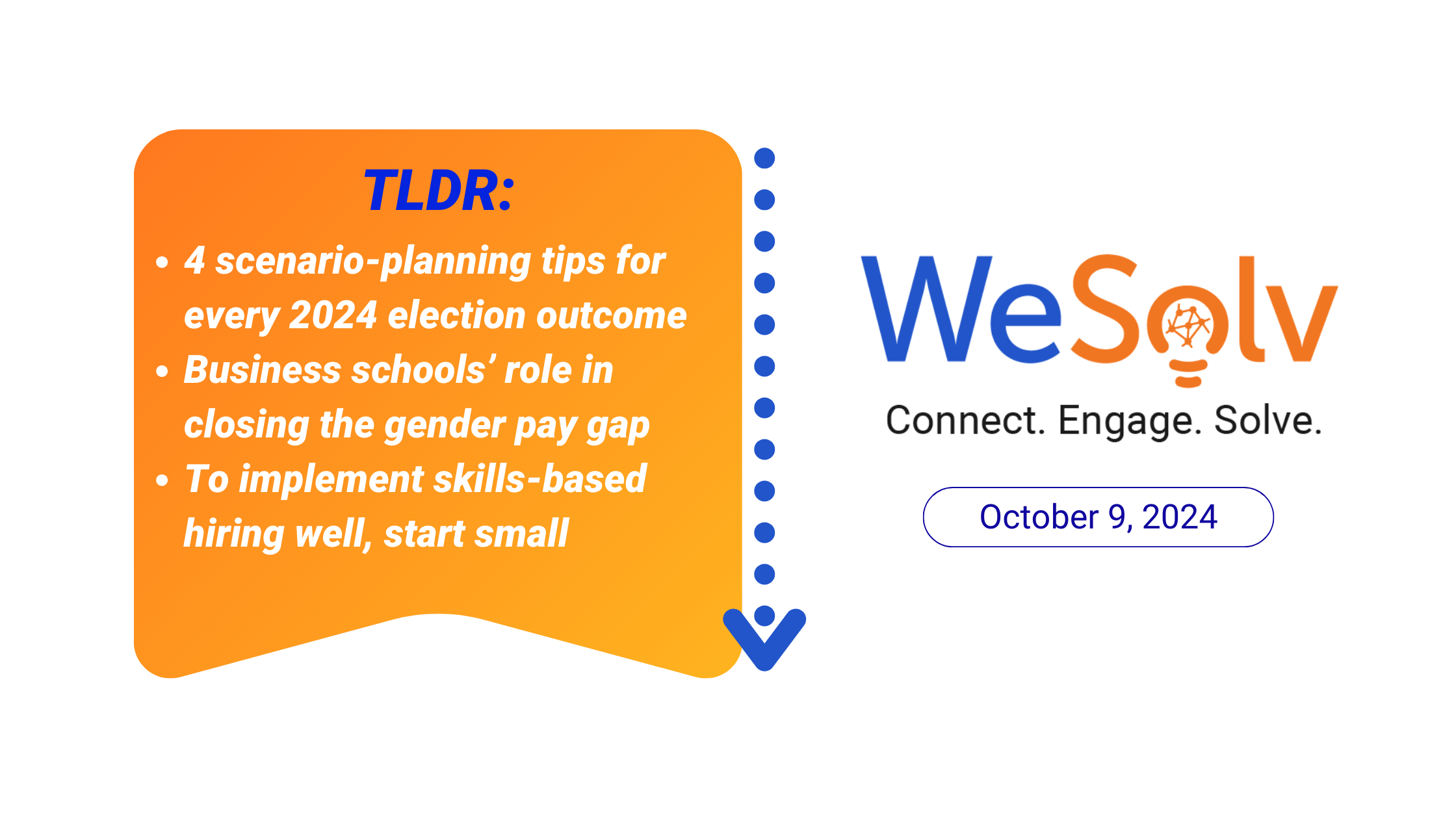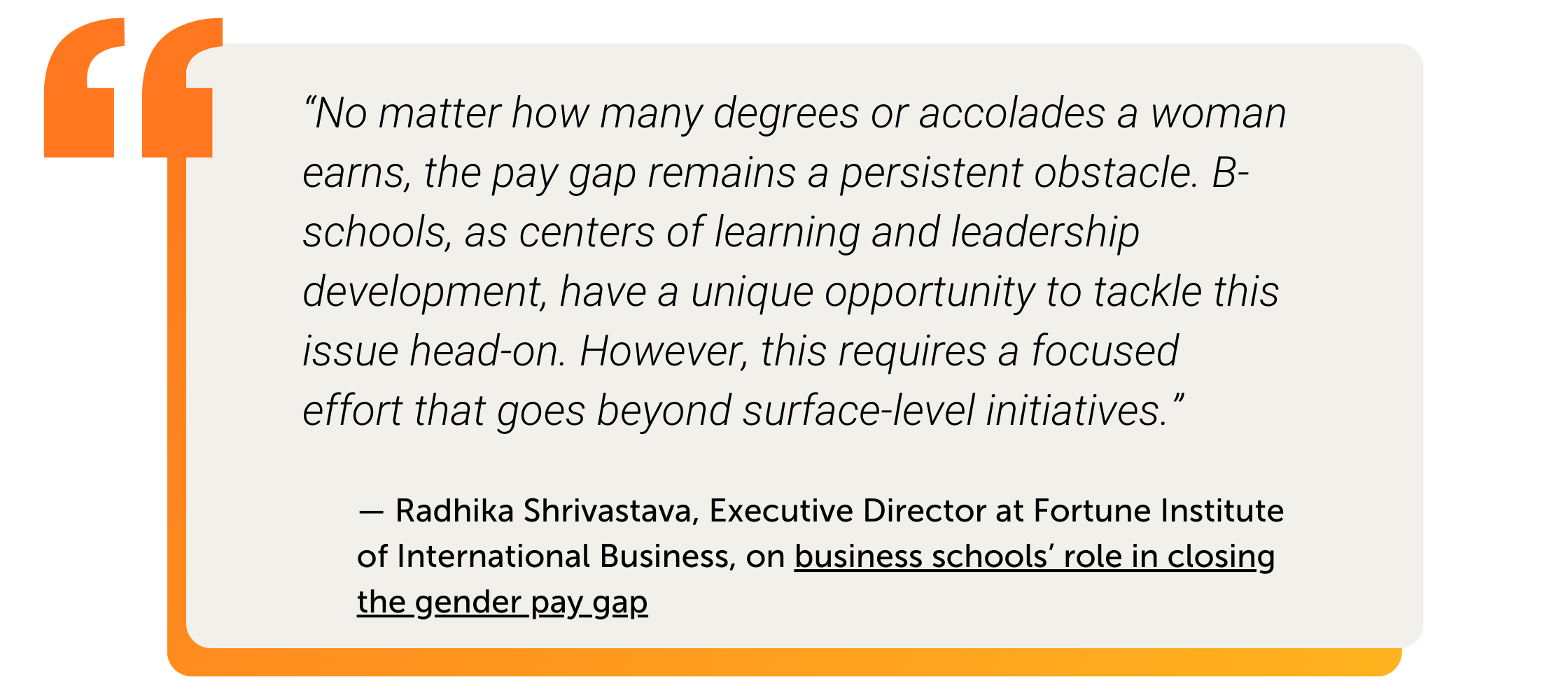Welcome to WeSolv’s monthly newsletter for our employer and university partners! Here, we’ll break down trending DEI x hiring news and equip you with the insights you need to support, attract, and hire talented underrepresented advanced degree candidates. Click here to receive these newsletters directly to your inbox each month.
Election years impact the way we work and obtain degrees in the U.S. That’s always been true, but this year’s presidential election could be an especially impactful example.
From policies that impact workplace inclusion and key employee benefits, like parental leave and healthcare, to our country’s approach to AI, hiring, and workforce upskilling, there are a number of lasting scenarios employers must prepare for based on who next assumes the Oval Office. (You can find a breakdown of Kamala Harris v. Donald Trump’s stances on these topics on SHRM.)
There’s also the immediate future to prepare for, as we approach the first presidential election since January 6th. That election saw instability and violence, stoked by a sitting president who spread lies of election fraud and encouraged an insurrection on the Capitol — something the Supreme Court has essentially invited him to do again with impunity. With “extreme rhetoric” being pointed at by about half of voters as reason for, among other things, the two assassination attempts on Trump this summer, political violence researchers are sounding alarms that this volatility could continue.
There’s a lot of uncertainty in the air, to put it lightly. But in all Election Day outcomes, leaders are likely to have pivotal decisions to make in response to changing laws and economic policies. We’ll need contingency plans that keep our workplaces and universities resilient and ready for whatever comes next, in the election’s aftermath and long after it.
That’s why on October 17th (2-3 p.m. ET), WeSolv is hosting a roundtable discussion for CEOs, DEI leaders, and department heads on Scenario Planning Amidst Economic and Political Uncertainty. In this free, off-the-record forum, we’ll cover:
Strategic planning & adaptation strategies for future-ready organizations
Talent & leadership resilience tips for turbulent times
Best practices for supporting teams & maintaining morale
The value of re-committing to DEI to foster innovation, regardless of the political landscape
Together, we can be prepared with actionable strategies for supporting talent and ensuring organizational readiness in a changing world. (And on the subject of supporting talent: Make sure everyone at your org has the ability this November 5th to get to a polling location to vote!)
Keep reading below for a handful of our scenario planning strategies, and join us on the 17th to hear from a panel of experts and your peers about meeting this moment head-on.
To getting and staying future-ready,
Stella Ashaolu
CEO and Founder, WeSolv

1. Foster a culture of open dialogue and inclusivity.
This election is already fueling intense division and polarization in workplaces and on campuses. Leaders should proactively plan for increased tensions by doubling down on a culture of open dialogue, respect, and inclusivity. Consider bringing in a third party facilitator for training on constructive conversations and unconscious bias, and establish a clear conflict resolution framework while you’re at it.
As with all DEI-related trainings, optional attendance is best. But you can incentivize attendance by letting attendees take the rest of the day off after an early afternoon training, or by offering a certificate or badge for LinkedIn.
2. Anticipate shifts in higher education policy and student support.
Changes in things like federal funding for universities, student debt relief, and DEI rulings could be coming, and increased attention toward AI use and research is certain regardless of who’s elected.
Scenario planning should address how potential reforms could affect student enrollment and financial aid offerings. Preparing for both increased and decreased federal funding will help universities develop contingency plans, like offering more financial counseling, adjusting tuition rates, or securing alternative funding sources to support students. On the DEI preparedness side, see our guide to navigating diversity programming risks.
3. Plan for the impact of immigration reforms on hiring and student enrollment.
Immigration reforms could affect both higher education and workforce planning. In the event of more restrictive policies, company leaders should scenario-plan for how this could impact talent pipelines, with contingency strategies like tapping into new regional recruitment channels, collaborating with local governments for workforce development grants, and exploring visa sponsorship programs.
For universities, creating cross-border educational partnerships that focus on joint degree programs, exchange programs, or research collaborations with institutions abroad could be a means of universities remaining competitive in attracting global talent while navigating immigration restrictions.
4. Double down on practices of resilience, team support, and morale.
One way to do that is by zeroing in on leadership resilience, a topic we’ll cover in our October roundtable. This election year promises to bring change — hopefully the good kind — but if the past four years have shown us anything, it’s that cultivating leaders who can inspire confidence and guide teams through change always matters.
Conduct a resilience-building training for your organization’s leadership, and create peer groups for always-on leadership support. You could extend these groups beyond your organization or university, too, allowing a valuable inroad to external insights and networking with other industry and university leaders.
To dig deeper into these insights and share what’s working for you as a CEO, DEI leader, or department head, don’t forget to secure your spot for the free October 17th roundtable.
———————————————————-

———————————————————–

- A win for experiential learning. We’re excited to share WeSolv’s new partnership with uConnect, the leading all-in-one virtual career center platform. With this integration, universities can now add WeSolv Case Challenges directly to career services pages for a dynamic, hands-on way to prepare students for the reality of the workforce. (More.)
- Who’s staying true to DEI? Perhaps unexpectedly, Amazon. As the list of companies retreating from DEI grows, Amazon appears to be staying firm. The company, which employs a 69% BIPOC U.S. workforce, recently released a new racial equity audit, saying it “remain(s) committed to our vision to build inclusive and equitable experiences.” One result from the audit? A deeper focus on internal promotions. (More.)
- Harvard sees a dip in Black students. In its first incoming class admitted since affirmative action’s end, Black student enrollment is down (14% vs. 18% YoY) while Latino student enrollment is up slightly (16% vs. 14%) and AAPI enrollment holds steady (37%). Socioeconomic diversity appears to be a more significant yardstick; Harvard says a fourth of its incoming class will attend without family financial support. (More.)
- To implement skills-based hiring well, start small. That’s what Workday learned. For the past 12 months, the company has used its sales organization as an incubator to test skills-based hiring practices, driving a 32% reduction in time-to-hire, an 11% increase in accepted offers, and 51% higher candidate net promoter scores. This month, Workday will roll out skills-based hiring across its organization. (More.)
- 39%. That’s the number of HR professionals who say they’re having trouble upskilling workers, per a new survey, and 36% say they’re struggling to find the right talent. That’s likely a contributing factor why more than 1 in 3 HR workers are considering a career change, but more AI resources could help. (More.)
———————————————————————————–
 ghj
ghj
- 10 AI Tools to Supercharge Your Job Search, whether you’re a freshly minted MBA or seasoned professional.
- AI in the Workplace: Acceptable Use of Generative AI Tools. An interactive AI in the Workplace training covering ethical, responsible uses of AI.
- What Good Looks Like: A Corporate Accountability Report on DEI, put together by the Congressional Black Caucus.


